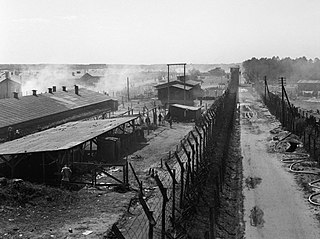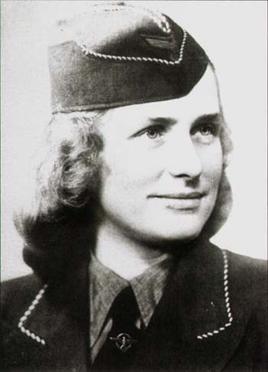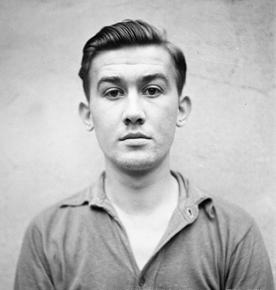1945 (MCMXLV) was a common year starting on Monday of the Gregorian calendar, the 1945th year of the Common Era (CE) and Anno Domini (AD) designations, the 945th year of the 2nd millennium, the 45th year of the 20th century, and the 6th year of the 1940s decade.
Fritz originated as a German nickname for Friedrich, or Frederick as well as for similar names including Fridolin and, less commonly, Francis. Fritz (Fryc) was also a name given to German troops by the Entente powers equivalent to the derogative Tommy. Other common bases for which the name Fritz was used include the surnames Fritsche, Fritzsche, Fritsch, Frisch(e) and Frycz.

Bergen-Belsen, or Belsen, was a Nazi concentration camp in what is today Lower Saxony in northern Germany, southwest of the town of Bergen near Celle. Originally established as a prisoner of war camp, in 1943, parts of it became a concentration camp. Initially this was an "exchange camp", where Jewish hostages were held with the intention of exchanging them for German prisoners of war held overseas. The camp was later expanded to hold Jews from other concentration camps.

Irmgard Ilse Ida Grese was a Nazi concentration camp guard at Ravensbrück and Auschwitz, and served as warden of the women's section of Bergen-Belsen. She was a volunteer member of the SS.

Aufseherin was the position title for a female guard in Nazi concentration camps. Of the 50,000 guards who served in the concentration camps, approximately 5,000 were women. In 1942, the first female guards arrived at Auschwitz and Majdanek from Ravensbrück. The year after, the Nazis began conscripting women because of a shortage of male guards. In the context of these camps, the German position title of Aufseherin translates to (female) "overseer" or "attendant". Later female guards were dispersed to Bolzano (1944–1945), Kaiserwald-Riga (1943–44), Mauthausen, Stutthof (1942–1945), Vaivara (1943–1944), Vught (1943–1944), and at Nazi concentration camps, subcamps, work camps, detention camps and other posts.

Elisabeth Volkenrath was a German supervisor at several Nazi concentration camps during World War II.

Herta Bothe was a German concentration camp guard during World War II. She was imprisoned for war crimes after the defeat of Nazi Germany, and was subsequently released early from prison on 22 December 1951.

Hildegard Neumann was a chief overseer at several Nazi concentration, transition and detention camps during the last year of World War II. She was born in Deutsch Gabel, Czechoslovakia.

Josef Kramer was Hauptsturmführer and the Commandant of Auschwitz-Birkenau and of the Bergen-Belsen concentration camp. Dubbed the Beast of Belsen by camp inmates, he was a German Nazi war criminal, directly responsible for the deaths of thousands of people. He was detained by the British Army after the Second World War, convicted of war crimes, and hanged on the gallows in the prison at Hamelin by British executioner Albert Pierrepoint.

Fritz Klein was an Austrian Nazi doctor and war criminal, hanged for his role in atrocities at Auschwitz concentration camp and Bergen-Belsen concentration camp during the Holocaust.
Helmut is a German name. Variants include Hellmut, Helmuth, and Hellmuth.

Franz Hößler, also Franz Hössler was a Nazi German SS-Obersturmführer and Schutzhaftlagerführer at the Auschwitz-Birkenau, Dora-Mittelbau and Bergen-Belsen concentration camps during World War II. Captured by the Allies at the end of the war, Hößler was charged with war crimes in the First Bergen-Belsen Trial, found guilty, and sentenced to death. He was executed by hanging at Hameln Prison in 1945.

Rudolph or Rudolf or Rodolphe is a male first name, and, less commonly, a surname. It is an ancient Germanic name deriving from two stems: Hrōþi, Hruod, Hróðr or Hrōð, meaning "fame", "glory" "honour", "renown", and olf meaning "wolf"(Hrōþiwulfaz).
Events in the year 1945 in Germany.

Ernst Heinrich Schmidt was a German physician and member of the SS, who practised Nazi medicine in a variety of German concentration camps during World War II. He was tried in 1947 and 1975 for complicity in war crimes, but was acquitted both times.

Wilhelm Dörr was a German SS-Oberscharführer and concentration camp officer. He served as a guard at the Mittelbau-Dora concentration camp and as deputy commander of the sub-camp of Kleinbodungen. Following World War II he was convicted of war crimes by British occupation authorities in the Belsen Trial and executed.

Anneliese Kohlmann was a German SS camp guard within the Nazi concentration camp system during World War II, notably, at the Neuengamme concentration camp established by the SS in Hamburg, Germany; and at Bergen-Belsen. She was tried for war crimes at the Belsen Trial in Lüneburg in 1946.
Karl is an originally Germanic variant of the male given name Charles meaning free man, or simply a man. For further details on origin and meaning, see Churl and Charles.
Josef is a variant of the masculine given name Joseph, notably used in Germany, Austria, Switzerland and the Czech Republic, and also in Scandinavia.

Irene Haschke was a German SS camp guard within the Nazi concentration camp system during World War II, notably, at the Bergen-Belsen camp in what is today Lower Saxony in northern Germany, southwest of the town of Bergen near Celle. She was born in Friedeberg, Neumark in what is now Poland.












